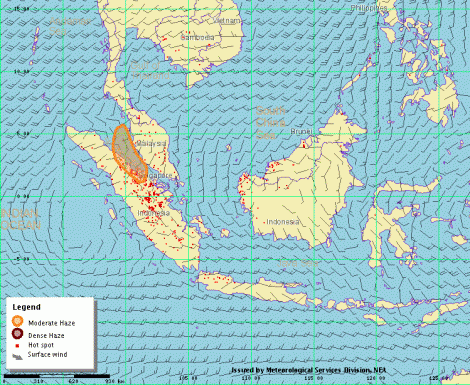I have been having a stuffed nose the last couple of weeks. Not much fun, that. Then this morning, I heard a relative in KL had a bad sore throat, presumably because of the air quality.

So it was with interest that I heard that the haze is back.
This morning I tweeted that Seberang Jaya is the only place in the country with an unhealthy API reading (103) at 7.00am. In response, I received a couple of tweets, sarcastic or otherwise.
@anilnetto <sarcasm>let’s blame that on the state government too since everything is their fault</sarcasm>
— VixStaRR North$yde (@vixstarrNS) June 21, 2012
Blame Umno/BN bro..must be them! @anilnetto: Haze API reading 103 in Sbrg Jaya at 7.00am-the only area in the country currently ‘unhealthy’.
— Firdaus Abdullah (@firdyfire) June 21, 2012
It is also fashionable to blame it all on the hot spots in Sumatra; so how do we explain that by 11.00am, Miri in Sarawak had joined in on the action with an API reading of 165? (Seberang Jaya remained at 103 while the rest of the country was still below 100.)
If we want to play the blame game, then blame our corporate culture that refuses to see any connection between business/corporate exploits and their environmental consequences. Who is responsible for the hot spots? Small-holders or large corporations? Or some vague culprits?
You have heard the saying, “It’s the economy, stupid!”
Well, there’s news for us. It’s not all about the economy. Our planet is hurtling towards an environmental cliff, but somehow all we can think of is the economy alone. That may be understandable for the world is heading for a serious economic downturn.
But it is time we change our mindsets. The economy is not paramount and should not supersede environmental consciousness.
Instead, the human economy should be seen as a subset of the ecology; and extreme care must be taken to ensure that economic activities do not upset the ecological balance.
It is time we hold businesses and corporations responsible for the environmental damage and degradation they cause.
In the case of Lynas for instance, they stand to reap fabulous profits – tax-free for 12 years, thanks to the ‘generous’ BN government – while the Malaysian public is left having to deal with the environmental consequences.
In the same vein, some developers cut into our hills – public assets – and make large private profits, while the public are left with chopped and degraded hills. Similarly, some of our factories pollute our rivers and air while their shareholders earn healthy dividends.
All this boils down to the ‘privatisation of profits and socialisation of costs’ (including environmental costs). The profits go to the firms and their shareholders but the cost (including the cost of cleaning up the environment or say, dredging the sea-bed) falls on the public. This phenomenon is aggravated by the way we measure economic ‘success’ (GDP, ‘competitiveness’ rankings, FDI figures, etc) while ignoring the environmental degradation.
Thank goodness, we are gradually seeing a blossoming of environmental consciousness among the people. There is growing awareness that we are all part of an interconnected whole, the ecological framework.
To deter the culprits, it is time we introduce a corporate green tax and penalties for those firms and businesses that damage our hills and pollute our rivers, seas and air, thus seriously upsetting the ecological balance. If we do nothing, the consequences are too dire to imagine.
| Please help to support this blog if you can. Read the commenting guidlelines for this blog. |